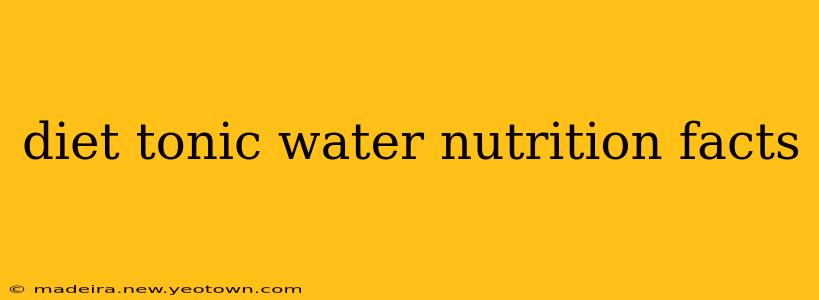Let's be honest, the allure of diet tonic water is strong. That crisp, slightly bitter taste, perfect for mixing a sophisticated gin and tonic or simply enjoying on its own as a refreshing beverage. But what's really in that bubbly goodness? And is it truly as guilt-free as the "diet" label suggests? This deep dive into diet tonic water nutrition facts will uncover the truth behind the fizz.
Our journey starts with the basics: a typical serving of diet tonic water (around 12 ounces) boasts a surprisingly low calorie count – often zero or very close to it. This is because the sugar found in regular tonic water is replaced with artificial sweeteners. That's the headline, the immediate appeal. But the story gets more complex.
What are the Main Ingredients in Diet Tonic Water?
The primary ingredients in most diet tonic water brands are carbonated water, artificial sweeteners (typically aspartame, sucralose, or acesulfame potassium), and quinine. Quinine is the key ingredient that gives tonic water its characteristic bitter taste and is naturally derived from the cinchona tree. However, the amounts are generally small, contributing very little to the overall nutritional profile.
Does Diet Tonic Water Have Any Calories?
How many calories are in diet tonic water? Most brands advertise zero calories per serving. However, it's crucial to check the specific nutrition label of the brand you're consuming, as minor variations can exist. Those near-zero calorie counts often stem from rounding down; a tiny fraction of a calorie might technically be present.
What are the Artificial Sweeteners in Diet Tonic Water?
What kind of artificial sweeteners are used in diet tonic water? This varies by brand, but common culprits include aspartame, sucralose, and acesulfame potassium. Each of these sweeteners carries its own set of debates regarding long-term health effects, although current scientific consensus doesn't definitively link them to major health problems in moderate consumption. However, individual sensitivities and preferences are significant factors to consider. Reading ingredient labels carefully is always a good practice.
Is Diet Tonic Water Good for Weight Loss?
Is diet tonic water helpful for weight loss? While it's significantly lower in calories than regular tonic water, diet tonic water itself won't magically melt away pounds. Its role in a weight-loss strategy is primarily about substituting higher-calorie beverages. It can be a useful part of a comprehensive diet plan focusing on calorie control and balanced nutrition, but it's not a miracle cure.
Are There Any Side Effects of Drinking Diet Tonic Water?
What are the possible side effects of drinking diet tonic water? While generally considered safe for most people, some individuals may experience side effects related to the artificial sweeteners. These can range from headaches and digestive upset to more serious reactions in those with pre-existing sensitivities. As with any food or beverage, moderation is key. The quinine content is typically not a concern at the levels found in commercially produced tonic water.
The Verdict: A Balanced Perspective on Diet Tonic Water
Diet tonic water offers a lower-calorie alternative to its sugary counterpart. It can be part of a healthy lifestyle, but it's not a health food. Moderation and awareness of the artificial sweeteners are crucial. The best approach is informed consumption: read labels, understand your own sensitivities, and incorporate it into a broader healthy lifestyle that emphasizes balanced nutrition and overall well-being. Remember, the real magic lies not just in the drink itself, but in the context of a holistic and mindful approach to your diet.

